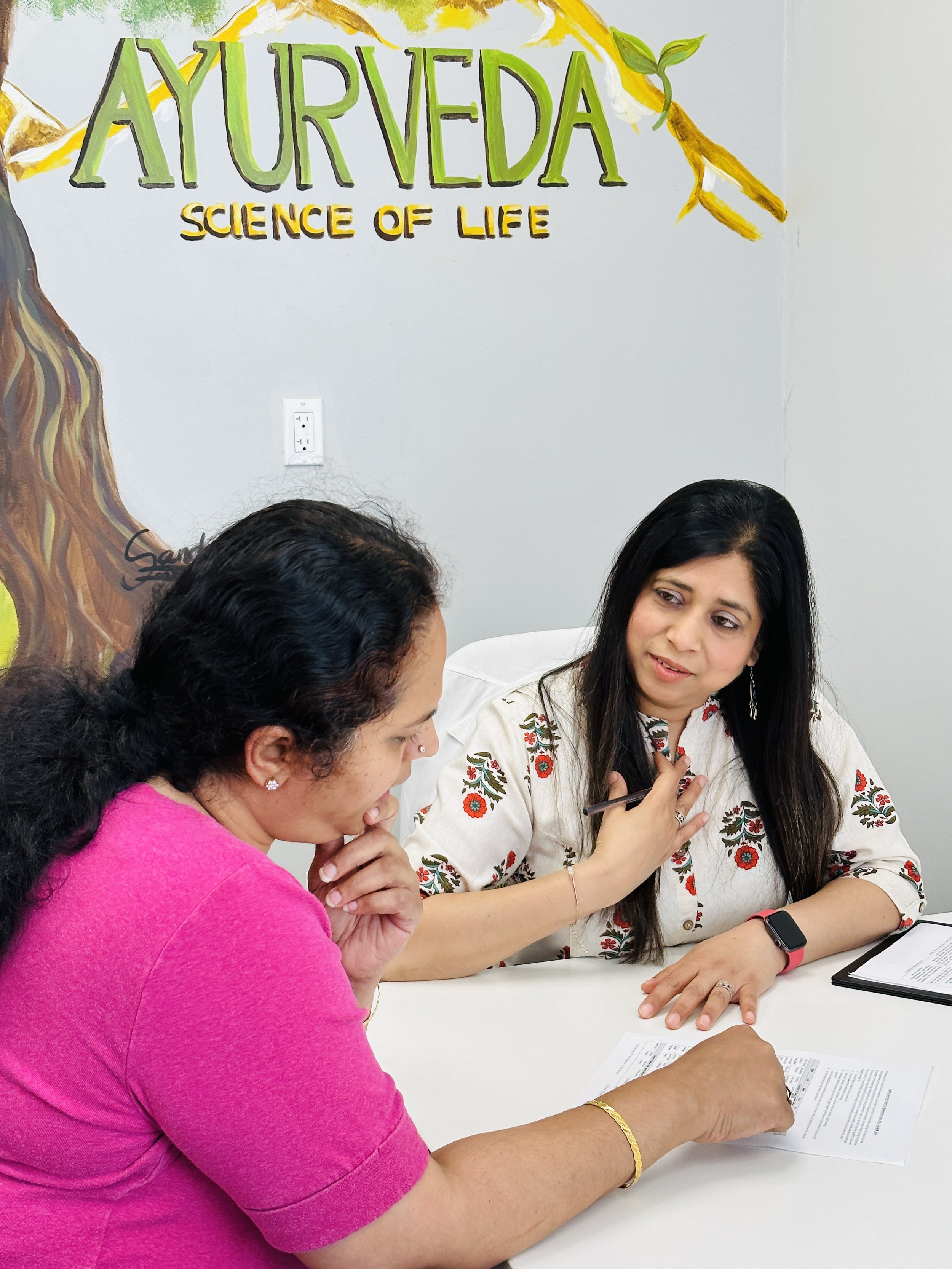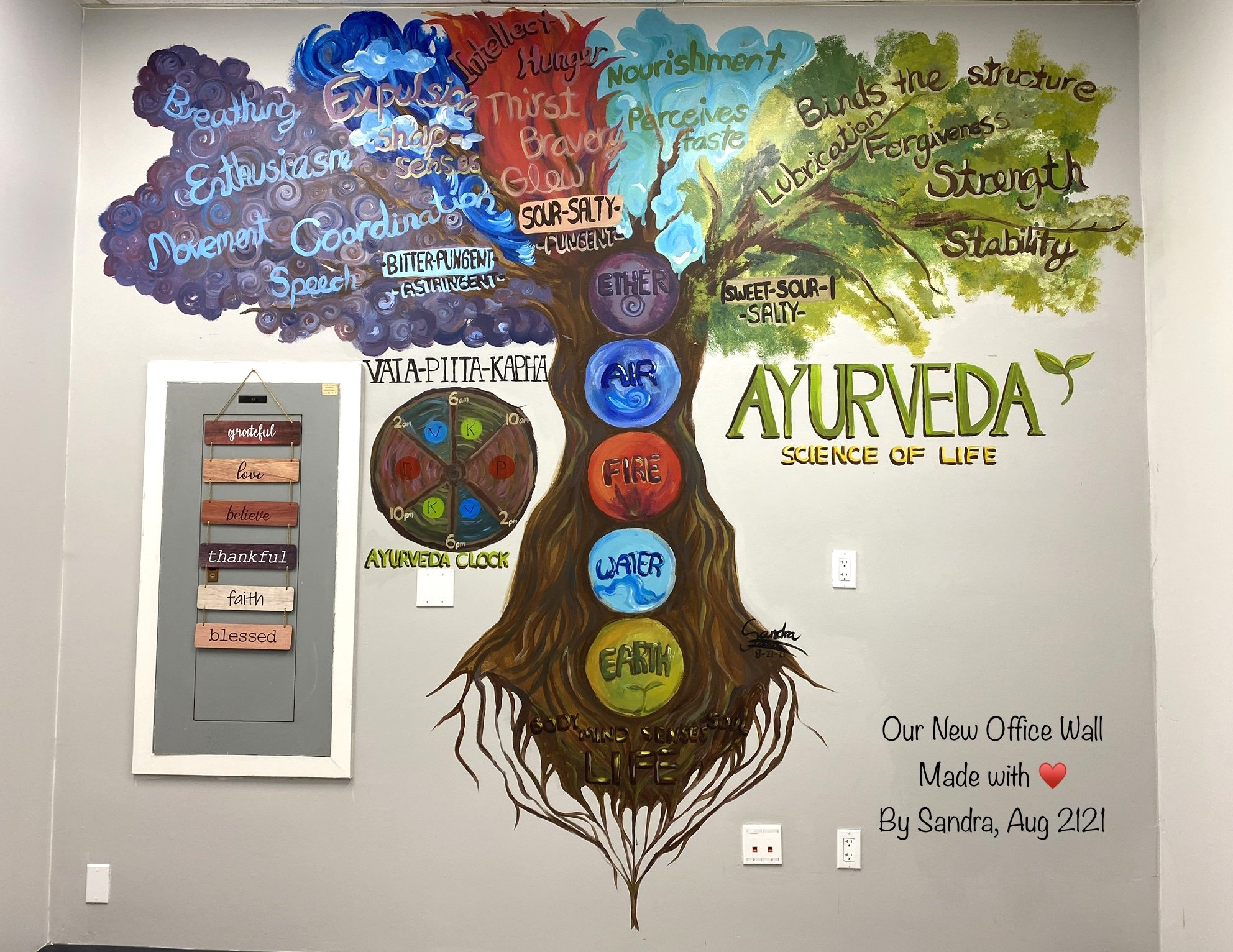Meet Preeti Gupta
When Preeti encountered a serious health challenge within her own family, she was heartbroken to see how food, which should be nourishing, seemed to cause harm. Preeti asked, “How can food, which is supposed to be nourishing, be detrimental?” Determined to find answers, she turned to research, drawing on her engineering mindset to explore Western nutrition. She began creating her own recipes and educating her family about mindful eating. However, she found that this approach didn’t give her the results she was hoping for. Seeking deeper solutions, she discovered “Integrated Ayurveda, Yoga, and Western Medicine” at Mount Madonna Institute, College of Ayurveda in Watsonville, where she became a certified Ayurveda Health Counselor.
Ayurveda, an ancient Indian science focused on preventative care and treatment through diet, lifestyle, and herbs, transformed her approach to health. With consistent changes in diet and daily habits, she saw firsthand the profound impact of Ayurvedic principles. Motivated by her desire to share this wisdom, she founded Minute Wonder in 2010. Preeti’s journey was not just about addressing a personal health crisis—it became a mission to help others navigating similar struggles. She began working with her community, inviting friends and family to experience the benefits of Ayurveda.
This passion led her to immerse herself in classical Ayurvedic studies, dedicating over 4,000 hours at Shubham Ayurveda Clinic & Classroom. She even mastered Sanskrit to fully grasp ancient texts and traveled to India for authentic training in Panchakarma and other traditional procedures, such as Ayurvedic massage, Shirodhara, Karna Purana, Vrana Karma, Agni Karma, Nadi Swedana, and various bodywork therapies. Additionally, she studied Ayurvedic food recipes and herbal formulations, including oils and decoctions, at Arya Ayurveda Clinic in Pune, India.
For over a decade, Preeti has been a beacon of hope for many seeking holistic health solutions through Ayurveda. With the growing demand for her expertise, she expanded her knowledge by completing business courses to enhance her outreach and human-centered approach. She also pursued 500 hours of training at McKinnon Body Therapy Center to become a licensed massage therapist, further deepening her understanding of bodywork and healing therapies.
With a unique background combining Western food industry insights, business knowledge, and a deep devotion to Ayurveda, Preeti’s approach to your health is truly unique and transformative!
She is a professional member of the National Ayurvedic Medical Association (NAMA) and part of the inaugural cohort of NAMA-certified Ayurvedic Doctors in the United States.
Ayurveda Clinic in San Ramon
According to the World Health Organization, health is “a state of complete physical, mental, and social well-being and not merely the absence of disease or infirmity.”
This definition of health reflects a holistic approach to well-being, recognizing that health is not just the absence of illness, but rather a state of overall physical, mental, and social well-being. This view is also reflected in the Ayurvedic tradition of medicine, which views health as a state of balance and harmony in the body, mind, and spirit.
In Ayurveda, optimal health is achieved when there is balance between the three doshas, or biological energies, of the body:
vata, pitta, and kapha.
The Sushruta Samhita, an ancient Ayurvedic text, further defines health as “sama dosha” (balanced doshas), “sama agni” (balanced digestive fire), “sama dhatu” (balanced conversion of food into the body’s seven different tissues), “mala kriya” (proper elimination of waste when food is metabolized), and “prasanna atma indriya manaha” (a blissful soul, senses, and content mind).
These doshas are believed to govern the functions of every part of the body, and when they are in balance, the body is able to function optimally and maintain good health.
Some of the other principles of health in Ayurveda include:
-
Eating a balanced diet that is suitable for one’s individual constitution and needs is important for maintaining good health according to Ayurveda. This may involve incorporating a variety of whole, natural foods, and avoiding foods that are processed, refined, or otherwise unhealthy.
-
Adopting a healthy lifestyle that includes regular exercise, stress management techniques, and sufficient rest and sleep is important for maintaining good health according to Ayurveda.
-
Paying attention to one’s personal needs and seeking medical treatment when necessary is important for maintaining good health according to Ayurveda. This may involve self-care practices such as yoga, meditation, and herbal remedies.
-
Ayurveda recognizes the important connection between the mind and the body, and emphasizes the importance of maintaining a positive and balanced state of mind in order to maintain good health.
The Ayurvedic perspective on health aligns with the holistic approach advocated by the World Health Organization, recognizing that health is not just the absence of disease, but rather a state of overall physical, mental, and social well-being.
By adopting a healthy lifestyle and paying attention to their personal needs, individuals can work towards achieving and maintaining optimal health and well-being according to the principles of Ayurveda.
Common concerns we treat in adults and kids:
coughs, acute or chronic
chronic colds and ear infections
chronic sinusitis and rhinitis
menopausal issues, including hot flashes
& mood swingschronic fatigue, fibromyalgia
low energy and chronic exhaustion
autoimmune symptom management
low immunity, constantly getting sick
headaches and migraines
chronic pain
back, neck and shoulder pain
insomnia
stress and anxiety
digestive issues
respiratory problems
hormonal issues, including teens and women’s health
and many more!











